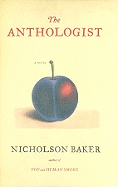

Paid to compile and introduce an anthology of rhyming poetry ("the genius's version of the crossword puzzle--when it's good. When it's bad it's intolerable dogwaste."), poet Paul Chowder (whose name happily evokes the rich stew that is this book) is stymied by a massive case of writer's block. The product of his affliction turns out to be a discourse on the craft of poetry that both entertains and instructs. In his hands, to cite but one of many examples, the concept of iambic pentameter as a "slow kind of gently swaying three-beat minuetto" makes a weird kind of sense. And it's clear he's obsessed with making his audience embrace poetry, for all its oddities and shortcomings, as much as he does. "My life is necessary," he writes, "because I sustain the idea of poetry through thick and thin. That's my job."
Chowder doesn't shrink from calling out his poetic villains, like haiku ("a kind of poetry that makes perfect, thrilling sense in Japanese, and makes no sense whatsoever in English") and free verse (dismissing nonrhyming poems as "plums"), with special scorn reserved for modernists like Ezra Pound. Yet he doesn't spare all rhyming poets, saving a special brickbat for Algernon Swinburne, whose propensity for rhyme "was like the application of too much fertilizer to a very green lawn."
As he struggles with his task, Chowder brings onstage a parade of poets, among them Theodore Roethke, W.S. Merwin and Elizabeth Bishop, whose popular poem, "The Fish," receives an extended analysis. Meanwhile, he mourns the end of a relationship with his girlfriend, Roz, while scheming to win back her affections by stringing together a beaded necklace that itself becomes an act of poetic creation. Along with this he must endure the intrusions of daily life, from a badly sliced finger to the task of organizing his office that includes boxing up his collection of poetry anthologies.
Read this novel for the sheer pleasure of meeting Baker's oddly appealing narrator and because you may well conclude when you've finished that if poetry isn't part of your life, you're missing something important. Whether or not that turns out to be the case, it's safe to say you'll never read a poem quite the same way again.--Harvey Freedenberg
Shelf Talker: In his latest novel, Nicholson Baker delivers a sly and charming tribute to the art of poetry and its practitioners.

